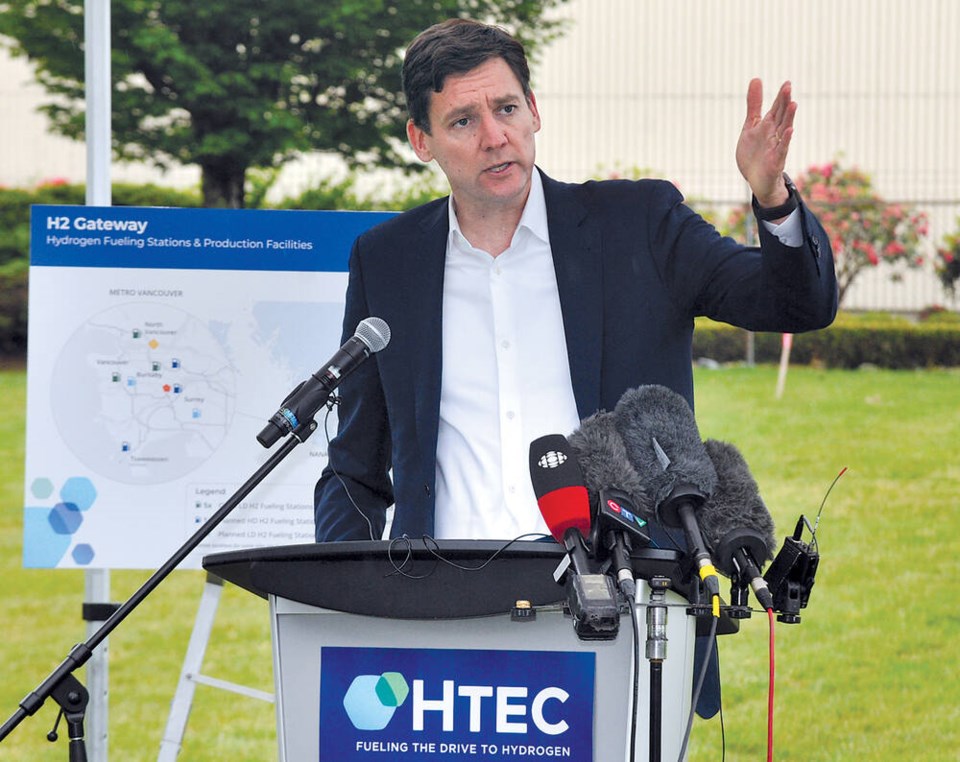The Canada Infrastructure Bank is kicking in hundreds of millions of dollars in financing to kickstart a major hydrogen fuelling network across Western Canada.
Dignitaries were at the site of a future hydrogen plant in North Vancouver Friday to announce the H2 Gateway project, which will include three new clean hydrogen production facilities and 18 fuelling stations in B.C. and Alberta, all led by Metro Vancouver’s HTEC.
The $900-million project is intended to provide a reliable supply chain of hydrogen for medium- and heavy-duty industrial vehicles.
Because of its quick refuelling time and no need for large batteries, hydrogen is poised to become the preferred zero-emission energy source for industry as it moves to decarbonize, said HTEC CEO Colin Armstrong.
The new plants will be built in Burnaby, Nanaimo and Prince George. The first seven hydrogen-fuelled heavy trucks are due to show up on B.C. roads later this year. Once fully operational, the project is forecasted to reduce greenhouse gas emissions approximately 133,000 tonnes annually.
But, more than cutting emissions in B.C., Armstrong said funding will also go a long way to catalyzing the expansion of hydrogen fuel everywhere.
“Once we do this, we believe we can take it certainly across the country and to the rest of the world,” he said. “We’ve got a lot to do and the time is now, so this is a big vote of confidence.”
The project is expected to create 250 new jobs in construction and 150 new permanent jobs for operations.
The Canada Infrastructure Bank is providing $337 million in financing for the project.
B.C.’s Ministry of Energy, Mines and Low Carbon Innovation, meanwhile, has provided HTEC with up to $130 million in carbon credits, which the company can then sell to other firms looking to meet their carbon reduction commitments.
Premier David Eby said it was fitting that the Lower Mainland – where more than half of the companies in the field are located – should become the “Silicon Valley” of hydrogen research and development given B.C.’s record-setting forest fires.
“The need to address climate change is very obvious in British Columbia because we are on the front lines of climate impacts,” he said. “It would be a massive, negligent error on a scale economically, that has not been seen long time in Canada, if we did not take advantage of our positioning, of our technology, of our people and our electricity to seize this moment.”
The project builds on another one already underway by HTEC – the purchase of ERCO Worldwide’s sodium chlorate plant in Maplewood. The facility produces chemicals for industrial uses, but it also gives off more than 15 tonnes of hydrogen per a day as a byproduct. HTEC is building electrolyzers to capture that hydrogen and feed it into the supply chain.
Armstrong said he had been eyeing the facility for hydrogen capture since he co-founded HTEC in North Vancouver 20 years ago
The project drew praise from B.C. Energy, Mines and Low Carbon Innovation Minister Josie Osborne.
“This is turning waste into a clean fuel and it’s exactly the type of innovation that we need to see more of,” she said. “Using renewable electricity to make emissions-free hydrogen means we’re displacing diesel, we’re cutting pollution from heavy duty transportation, and that is a huge benefit for people and the environment.”
Natural Resource Minister and North Vancouver MP Jonathan Wilkinson said, as a former hydrogen tech CEO and current hydrogen car owner, he appreciated the advancement of HTEC’s projects. But, he added, the federal government sees even more for the element’s future in Canada’s economy.
Under Natural Resources Canada’s hydrogen strategy, the government envisions hydrogen making up 31 per cent of the energy consumed by users by 2050, with a domestic market alone estimated to be worth $50 billion per year.
“Climate change is also rapidly changing and transforming the global economy and global finance in ways that are creating enormous economic opportunities for those who approach the transition to a low-carbon future in a thoughtful, determined and focused manner,”
Both Eby and Wilkinson used to the opportunity to take digs at their right-of-centre opponents, suggesting they did not take climate change seriously and that they would “tear up” the kind of progress being announced.




